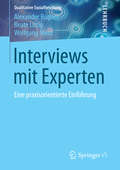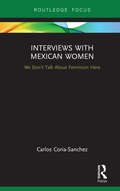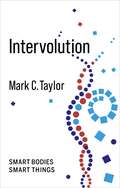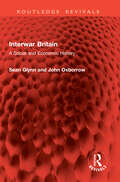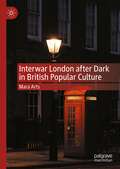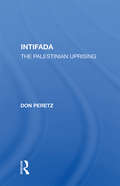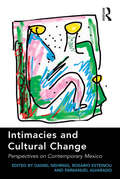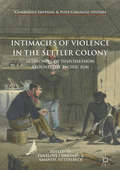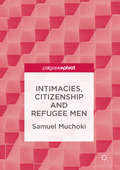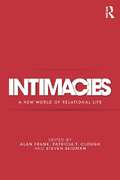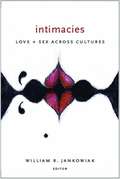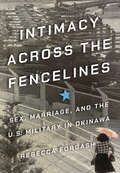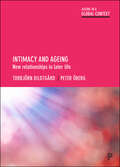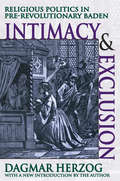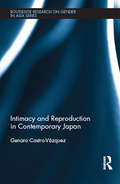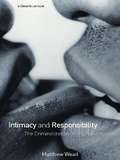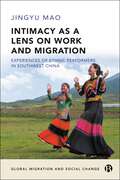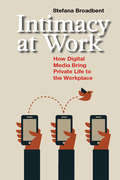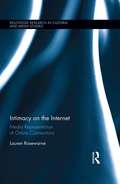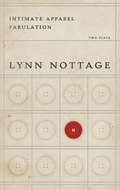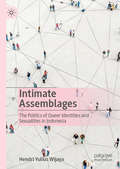- Table View
- List View
Interviews mit Experten: Eine praxisorientierte Einführung (Qualitative Sozialforschung)
by Wolfgang Menz Alexander Bogner Beate LittigDie eminente Bedeutung von ExpertInneninterviews für die Forschungspraxis ist unumstritten. Sie gehören in vielen sozialwissenschaftlichen Disziplinen zur alltäglichen Forschungspraxis; sei es als eigenständige Erhebungsmethode, sei es als exploratives oder ergänzendes Instrument im Kontext quantitativer oder qualitativer Forschungsdesigns. Auf der anderen Seite sind ExpertInneninterviews trotz (oder wegen?) ihrer Praxisrelevanz methodisch wenig reflektiert. Dieses Defizit will der vorliegende Band beheben und eine übersichtliche, fundierte und an forschungspraktischen Problemen orientierte Einführung in Theorie und Praxis der ExpertInneninterviews bieten. Neben der Diskussion des methodologischen Hintergrunds und zentraler wissenssoziologischer Basisannahmen (ExpertInnenbegriff, Wissensformen) steht dabei insbesondere die Vorbereitung, Durchführung und Auswertung von ExpertInneninterviews im Mittelpunkt.
Interviews with Mexican Women: We Don't Talk About Feminism Here (Focus on Global Gender and Sexuality)
by Carlos Coria-SanchezInterviews with Mexican Women: We Don’t Talk About Feminism Here presents a series of conversations with Mexican women representing a wide geographical range within Mexico. The interviews broach current social issues and discuss their correlation to the Mexican feminist movement of the 1970s and 1980s. This unique project focuses on cultural, political, economic, and social topics as they pertain to Mexican women impacted (or not) by the women’s struggle in Mexico to achieve gender equality in their country. This book offers a rare insight into feminist influence on many areas of social life, and will be a vital text for students and researchers in Gender Studies and Mexican or Latin American Studies.
Interviews/Entrevistas
by Gloria E. AnzalduaGloria E. Anzaldúa, best known for her books Borderlands/La Frontera and This Bridge Called My Back, is one of the foremost feminist thinkers and activists of our time. As one of the first openly lesbian Chicana writers, Anzaldúa has played a major role in redefining queer, female, and Chicano/a identities, and in developing inclusionary movements for social justice.In this memoir-like collection, Anzaldúa's powerful voice speaks clearly and passionately. She recounts her life, explains many aspects of her thought, and explores the intersections between her writings and postcolonial theory. Each selection deepens our understanding of an important cultural theorist's lifework. The interviews contain clear explanations of Anzaldúa's original concept of the Borderlands and mestizaje and her subsequent revisions of these ideas; her use of the term New Tribalism as a disruptive category that redefines previous ethnocentric forms of nationalism; and what Anzaldúa calls conocimientos-- alternate ways of knowing that synthesize reflection with action to create knowledge systems that challenge the status quo.Highly personal and always rich in insight, these interviews, arranged and introduced by AnaLouise Keating, will not only serve as an accessible introduction to Anzaldúa's groundbreaking body of work, but will also be of significant interest to those already well-versed in her thinking. For readers engaged in postcoloniality, feminist theory, ethnic studies, or queer identity, Interviews/Entrevistas will be a key contemporary document.
Intervolution: Smart Bodies Smart Things (No Limits)
by Mark C. TaylorWhere does my body begin? Where does it end? What is inside my body? What is outside? What is primary? What is secondary? What is natural? What is artificial?Science fiction has long imagined a future fusion of humanity with technology. Today, many of us—especially people with health issues such as autoimmune diseases—have functionally become hybrids connected to other machines and to other bodies. The combination of artificial intelligence with implants, transplants, prostheses, and genetic reprogramming is transforming medical research and treatment, and it is now also transforming what we thought was human nature.Mark C. Taylor identifies this process as “intervolution” and explores how it is weaving together smart things and smart bodies to create new forms of life. Our wired bodies are no longer freestanding individuals, but interconnected nodes in worldwide networks. Recognizing this transformation overturns deeply entrenched distinctions and oppositions between minds and bodies. Intervolution reveals that we are already cyborgs, integral cogs in what will become a superorganism of bodies and things.
Interwar Britain: A Social and Economic History (Routledge Revivals)
by Sean Glynn John OxborrowFirst published in 1976, Interwar Britain presents a highly readable and up-to-date account of a crucial period in modern British history. The major economic and social issues, ranging from economic growth and policy to social welfare and housing, are examined in detail, and full account is taken both of recent research and of the important areas of ignorance.The emphasis, however, is upon interpretation and analysis rather than detail, and a new and illuminating approach is presented in dealing with many of the leading problems of the period, particularly unemployment and labour relations.The book will be of major interest to students of economic history, social policy, and to all concerned to know more about the economic and social influences which have shaped modern Britain.
Interwar London after Dark in British Popular Culture
by Mara ArtsThis book explores the representation of London’s nightlife in popular films and newspapers of the interwar period. Through a series of case-studies, it analyses how British popular media in the 1920s and 1930s displayed the capital after dark. It argues that newspapers and films were part of a common culture, which capitalized on the transgressive possibilities of the night. At the same time both media ensured that those in authority, such as the police, were always shown to ultimately be in control of the night. The first chapter of the book provides an overview of the British film and newspaper industries in the interwar period. Subsequent chapters each explore a specific aspect of London’s nightlife. In turn, these chapters consider how films and newspapers of the interwar period depicted women navigating the street at night; the Metropolitan Police’s involvement in nightlife; and the capital’s newly built and expanded suburbs and public transport network. Finally, the book considers how newspapers and films depicted themselves and one another.
Intifada: The Palestinian Uprising
by Don Peretz"This book is intended as an overview of the uprising-the Intifada of the Palestinian Arabs in the West Bank and Gaza, territories occupied by Israel since the June 1967 war. In the two years since the Intifada began during December 1987, it has acquired unusual international importance and visibility and has led to a number of significant changes in the policies of the principal actors involved, especially Israel, the United States, the Palestine Liberation Organization, and the Palestinian inhabitants of the occupied territories. The Intifada has altered, in many ways, the dimensions of the Arab-Israeli conflict by rearranging the order of political and diplomatic priorities of those involved and by thrusting the conflict to the forefront of international attention. This book describes the background, origins, and causes of the uprising and its impact on the actors; it also examines the prospects for coping with it. I am obligated to my wife, Dr. Maya Peretz, for her assistance in preparing the manuscript and in helping to meet the publisher's deadlines, which sprang upon us more quickly than anticipated. Thanks also go to Deena Hurwitz, to Palestine Perspectives, and to the UNRWA Liaison Office in New York for the photos used. Finally, I wish to express my appreciation to the Rockefeller Foundation for the time I spent at its Study Center in Bellagio, Italy, during the final editing stage of this book."
Intimacies and Cultural Change: Perspectives on Contemporary Mexico
by Daniel Nehring Rosario EsteinouExploring cultural transformations of intimacy in contemporary Mexico, Intimacies and Cultural Change examines the ways in which globalization and rapid cultural change have transformed the cultural meanings of couple relationships, sexuality, and personal life in Mexican society. Through a range of contemporary case studies, the book sheds light on the ways in which people draw on these cultural meanings in everyday life to account for their experiences and practices of intimacy in different social settings. An interdisciplinary volume, presenting the latest research on the region from experts working in diverse fields within the social sciences, this book will appeal to scholars of sociology, anthropology, geography and social psychology with interests in gender and sexuality, social change and contemporary intimate relationships.
Intimacies of Violence in the Settler Colony: Economies Of Dispossession Around The Pacific Rim (Cambridge Imperial and Post-Colonial Studies Series)
by Amanda Nettelbeck Penelope EdmondsViolence and intimacy were critically intertwined at all stages of the settler colonial encounter, and yet we know surprisingly little of how they were connected in the shaping of colonial economies. Extending a reading of ‘economies’ as labour relations into new arenas, this innovative collection of essays examines new understandings of the nexus between violence and intimacy in settler colonial economies of the British Pacific Rim. The sites it explores include cross-cultural exchange in sealing and maritime communities, labour relations on the frontier, inside the pastoral station and in the colonial home, and the material and emotional economies of exploration. Following the curious mobility of texts, objects, and frameworks of knowledge, this volume teases out the diversity of ways in which violence and intimacy were expressed in the economies of everyday encounters on the ground. In doing so, it broadens the horizon of debate about the nature of colonial economies and the intercultural encounters that were enmeshed within them.
Intimacies, Citizenship and Refugee Men
by Samuel MuchokiThis timely book moves beyond struggling, suffering and loss to argue that forced migration often provides opportunities for men to pursue new relationships and re-organise their intimate lives. It focuses on the lived experiences of masculinity, sexuality and pursuit of intimate relationships by men who have arrived in Australia as refugees from the Horn of Africa. The author shows that, even amidst the chaos of displacement, the difficulties of living in limbo whilst seeking asylum and the challenges of settlement, the desire for enjoyable and fulfilling intimate relations remains central to the everyday lives of refugee men. This novel work will appeal to students and scholars of migration studies, citizenship, race, ethnicity, gender and sexuality.
Intimacies: A New World of Relational Life
by Patricia Ticineto Clough Steven Seidman Alan FrankIn the last decade or so, there has been a shift in the popular and academic discussion of our personal lives. Relationships – and not necessarily marriage – have gravitated to the center of our relational lives. Many of us feel entitled to seek intimacy, an emotionally depthful social bonding, rather than simply security or companionship from our relationships. Unlike in a marriage-centred culture, intimacy is today pursued in varied relationships, from familial to friends and to romances. And intimacies are being forged in multiple venues, from face-to-face to virtual, cyber contexts. A new scholarship has addressed this changing terrain of personal life – there is today a vast literature on cohabitation, parenthood without marriage, sex and love outside marriage, queer families, cyber intimacies and friendships. However, much theorizing and research has focussed either on the interior, subjective or sociocultural aspects of intimacies, not their interaction. This volume aims to break new ground: Intimacies explores the psychological terrain of intimacy in depthful ways without abandoning its sociohistorical context and the centrality of power dynamics. Drawing on a rich archive that includes the social sciences, feminism, queer studies, and psychoanalysis, the contributors examine: changing cultures of intimacy fluid and solid attachments and intimacies from hook ups, to sibling bonds, to erotic love a politics of intimacy that may involve state enforced hierarchies, class, misrecognition, social exclusion and violence embodied experiences of intimacy and dynamics of endings and loss a pluralization of intimacies that challenge established ethical hierarchies This volume aims to define the cutting edge of this emerging field of scholarship and politics. It challenges existing paradigms that assume rigid hierarchical approaches to relational life. Intimacies will be of interest for psychoanalysts and for students or scholars in sexualities, gender studies, family studies, feminism studies, queer studies, social class, cultural studies, and philosophy.
Intimacies: Love and Sex Across Cultures
by Ed. Jankowiak William R.No culture is ever completely successful or satisfied with its synthesis of romantic love, companionship, and sexual desire. Whether the setting is a busy metropolis or a quiet farming village, a tension always exists between a community's sexual habits and customs and what it believes to be the proper context for love. Even in Western societies, we prefer sexual passion to romance and companionship, and no study of any culture has shown that individuals regard passion and affection equally.The pursuit of love and sex has generated an infinite number of ambiguities and contradictions, yet every community hopes to find a resolution to this conflict either by joining, dividing, or stressing one act over the other. In this follow-up to Romantic Passion: A Universal Experience?, William R. Jankowiak examines how different cultures rationalize the expression of passionate and comfort love and physical sex. He begins by mapping out the intricacies of the love/sex conundrum and the psychological dilemma of reconciling these competing forces. He then follows with essays on sex, love, and intimacy among Central African foragers and farmers; the love dyad in Lithuania; intimacy among the Lahu of Southwestern China; the interplay of love, sex, and marriage in the High Himalayas; verbalized experiences of love and sexuality in Indonesia; love work as it relates to sex work among prostitutes; intimacies and estrangements in the marital and extramarital relationships of Huli men; infidelity and masculinity in Southwestern Nigeria; and the ritual of sex and the rejuvenation of the love bond among married couples in the United States.
Intimacies: Love and Sex Across Cultures
by William R. JankowiakA groundbreaking study of the ways in which we separate the search for sexual fulfillment from the impulse of love.
Intimacy across the Fencelines: Sex, Marriage, and the U.S. Military in Okinawa
by Rebecca ForgashIntimacy Across the Fencelines examines intimacy in the form of sexual encounters, dating, marriage, and family that involve US service members and local residents. Rebecca Forgash analyzes the stories of individual US service members and their Okinawan spouses and family members against the backdrop of Okinawan history, political and economic entanglements with Japan and the United States, and a longstanding anti-base movement. The narratives highlight the simultaneously repressive and creative power of military "fencelines," sites of symbolic negotiation and struggle involving gender, race, and class that divide the social landscape in communities that host US bases.Intimacy Across the Fencelines anchors the global US military complex and US-Japan security alliance in intimate everyday experiences and emotions, illuminating important aspects of the lived experiences of war and imperialism.
Intimacy and Ageing: New Relationships in Later Life (Ageing in a Global Context)
by Torbjörn Bildtgård Peter ÖbergTo begin new relationships in later life is increasingly common in large parts of the Western world. This timely book addresses the gap in knowledge about late life repartnering and provides a comprehensive map of the changing landscape of late life intimacy. Part of the Ageing in a Global Context series, the book examines the changing structural conditions of intimacy and ageing in late modernity. How do longer lives, changing norms and new technologies affect older people’s relationship careers, their attitudes to repartnering and in the formation of new relationships? Which forms do these new unions take? What does a new intimate relationship offer older men and women and what are the consequences for social integration? What is the role and meaning of sex? By introducing a gains-perspective the book challenges stereotypes of old age as a period of loss and decline. It also challenges the image of older people as conservative, and instead presents them as an avant-garde that often experiment with new ways of being together.
Intimacy and Exclusion: Religious Politics in Pre-revolutionary Baden (Princeton Studies In Culture/power/history Ser. #337)
by Dagmar HerzogIn this pathbreaking work, Dagmar Herzog situates the birth of German liberalism in the religious confl icts of the nineteenth century. During the years leading up to the revolutions of 1848, liberal and conservative Germans engaged in a contest over the terms of the Enlightenment legacy and the meaning of Christianity-a contest that grew most intense in the Grand Duchy of Baden, where liberalism fi rst became an infl uential political movement. Bringing insights drawn from Jewish and women's studies into German history, Herzog demonstrates how profoundly Christianity's problematic relationships to Judaism and to sexuality shaped liberal, conservative, and radical thought in the pre-revolutionary years.In particular, she reveals how often confl icts over the private sphere and the"politics of the personal" determined larger political matters.
Intimacy and Reproduction in Contemporary Japan (Routledge Research on Gender in Asia Series)
by Genaro Castro-VazquezThis book presents an ethnographic investigation of intimate and reproductive behaviour in current Japanese society, grounded in the viewpoints of a group of Japanese mothers. It adopts a new approach in studying the decreasing fertility rates which are contributing to the ageing population in modern Japan. Based on the accounts of 57 married Japanese women, it employs symbolic interactionism as a framework to examine the various factors affecting decision-making on childbirth. The influence of Assisted Reproductive Technologies (ARTs), abortion and contraception in the daily interactions and experiences of the mothers are analysed to offer a new perspective on the Japanese demographic conundrum. With strong contextual information as the foundation, the book contributes fresh insight into how Japanese women perceive the idea of childbirth in a modernized society, and also assists our understanding of the factors causing Japan’s ageing population. Further, it places the mothers’ experiences within current global debates to highlight the salience of the Japanese case. As the first book to provide an in-depth examination of the social process underpinning the decision to become a mother in Japan, it will appeal to students and scholars of Japanese culture and society, Gender Studies, and Sociology.
Intimacy and Responsibility: The Criminalisation of HIV Transmission
by Matthew WeaitIn what circumstances and on what basis, should those who transmit serious diseases to their sexual partners be criminalised? In this new book Matthew Weait uses English case law as the basis of a more general and critical analysis of the response of the criminal courts to those who have been convicted of transmitting HIV during sex. Examining cases and engaging with the socio-cultural dimensions of HIV/AIDS and sexuality, he provides readers with an important insight into the way in which the criminal courts construct the concepts of harm, risk, causation, blame and responsibility. Taking into account the socio-cultural issues surrounding HIV/AIDS and their interaction with the law, Weait has written an excellent book for postgraduate and undergraduate law and criminology students studying criminal law theory, the trial process, offences against the person, and the politics of criminalisation. The book will also be of interest to health professionals working in the field of HIV/AIDS genito-urinary medicine who want to understand the issues that may face their clients and patients.
Intimacy as a Lens on Work and Migration: Experiences of Ethnic Performers in Southwest China (Global Migration and Social Change)
by Jingyu MaoThis book explores the experiences of ethnic performers in a small Chinese city, aiming to better understand their work and migration journeys. Their unique position as service workers who have migrated within the same province provides valuable insights into the intersection of social inequalities related to the rural-urban divide, ethnicity and gender in contemporary China. Introducing the concept of ‘intimacy as a lens’, the author examines intimate negotiations involving emotions, sense of self and relationships as a way of understanding wider social inequalities. Drawing on ethnographic fieldwork, the book reveals the bordering mechanisms encountered by performers in their work as they navigate between rural and urban environments, as well as between ethnic minority and Han identities. Emphasising the intimate and personal nature of these encounters, the book argues that they can help inform understanding of broader social issues.
Intimacy at Work: How Digital Media Bring Private Life to the Workplace (Anthropology & Business #2)
by Stefana BroadbentAccording to some social critics, the digital age involves a retreat into the isolation of intelligent machines. Acclaimed scholar Stefana Broadbent takes another view, that digital technologies allow people to bring their private lives into the often alienating world of work. Through ethnographic evidence and data gathered from large samples in Europe and the U.S., Intimacy at Work looks at a paradox in modern life: Although human beings today spend so much of their waking hours working, they remain increasingly connected to family and friends—because of digital and social media. This book -shows how portable communications sustain personal networks offering a sense of identity, comfort, support, and enjoyment in the workplace;-demonstrates through numerous case studies that digital technologies provide a kind of “safety net” in times of economic crisis, softening the precariousness of existence;-is a revised edition of a volume published in French (L’Intimité au Travail, 2011), which won the prestigious AFCI Prize for books on business communications.
Intimacy on the Internet: Media Representations of Online Connections (Routledge Research in Cultural and Media Studies)
by Lauren RosewarneThe focus of this book is on the media representations of the use of the Internet in seeking intimate connections—be it a committed relationship, a hook-up, or a community in which to dabble in fringe sexual practices. Popular culture (film, narrative television, the news media, and advertising) present two very distinct pictures of the use of the Internet as related to intimacy. From news reports about victims of online dating, to the presentation of the desperate and dateless, the perverts and the deviants, a distinct frame for the intimacy/Internet connection is negativity. In some examples however, a changing picture is emerging. The ubiquitousness of Internet use today has meant a slow increase in comparatively more positive representations of successful online romances in the news, resulting in more positive-spin advertising and a more even-handed presence of such liaisons in narrative television and film. Both the positive and the negative media representations are categorised and analysed in this book to explore what they reveal about the intersection of gender, sexuality, technology and the changing mores regarding intimacy.
Intimacy, Photography, Shame: 1969–1992 (Routledge Research in Gender and Art)
by Harrison AdamsThis study argues that intimacy requires an overcoming of shame, and each of these artists, in their own way, uses photography to frame moments that can be shameful to some and intimate others, leaving it to the viewer to navigate this affectively perilous terrain.From the cancellation of Mapplethorpe’s retrospective The Perfect Moment to the obscenity trial in Cincinnati shortly thereafter, to Hujar’s lesser-known but equally “hardcore” imagery, to Goldin’s gritty depictions of domestic violence and substance abuse, to the accusations of child pornography thrown at Mann’s photographs of her own children, the photographers at the heart of this book have probed the limits of acceptability. But there is more to their work than merely controversy; it’s what causes the controversy that matters. The notion of intimacy is at stake in some of our most important human relationships, and thus a great deal hinges on both achieving and preserving intimacy.This book will be of interest to scholars working in art history, photography and gender studies.
Intimate Activism: The Struggle for Sexual Rights in Postrevolutionary Nicaragua
by Cymene HoweIntimate Activism tells the story of Nicaraguan sexual-rights activists who helped to overturn the most repressive antisodomy law in the Americas. The law was passed shortly after the Sandinistas lost power in 1990 and, to the surprise of many, was repealed in 2007. In this vivid ethnography, Cymene Howe analyzes how local activists balanced global discourses regarding human rights and identity politics with the contingencies of daily life in Nicaragua. Though they were initially spurred by the antisodomy measure, activists sought to change not only the law but also culture. Howe emphasizes the different levels of intervention where activism occurs, from mass-media outlets and public protests to meetings of clandestine consciousness-raising groups. She follows the travails of queer characters in a hugely successful telenovela, traces the ideological tensions within the struggle for sexual rights, and conveys the voices of those engaged in "becoming" lesbianas and homosexuales in contemporary Nicaragua.
Intimate Apparel/Fabulation
by Lynn Nottage"Lynn Nottage's work explores depths of humanness, the overlapping complexities of race, gender, culture and history--and the startling simplicity of desire--with a clear tenderness, with humor, with compassion." --Paula Vogel, Pulitzer Prize-winning playwrightIntimate Apparel: "Thoughtful, affecting new play . . . with seamless elegance."--Charles Isherwood, VarietyFabulation: "Robustly entertaining comedy . . . with punchy social insights and the firecracker snap of unexpected humor."--Ben Brantley, The New York TimesWith her two latest plays, "exceptionally gifted playwright" (New York Observer) Lynn Nottage has created companion pieces that span 100 years in the lives of African American women. Intimate Apparel is about the empowerment of Esther, a proud and shy seamstress in 1905 New York who creates exquisite lingerie for both Fifth Avenue boudoirs and Tenderloin bordellos. In Fabulation Nottage re-imagines Esther as Undine, the PR-diva of today, who spirals down from her swanky Manhattan office to her roots back in Brooklyn. Through opposite journeys, Esther and Undine achieve the same satisfying end, one of self-discovery.Lynn Nottage's plays include Crumbs from the Table of Joy; Mud, River, Stone; Por' Knockers; Las Menias; Fabulation and Intimate Apparel, for which she was awarded the Francesca Primus Prize and the American Theatre Critics/Steinberg New Play Award in 2004. Her plays have been produced at theatres throughout the country, with Intimate Apparel slated for 16 productions during the 2005-2006 season.
Intimate Assemblages: The Politics of Queer Identities and Sexualities in Indonesia
by Hendri Yulius WijayaWritten in the aftermath of Indonesia's anti-queer panic in 2016, this book tells the story of local queer movements in challenging the heteronormative society and resisting the homophobic hostility from religious conservative groups and the state. The year 2016 was a touchstone moment for queer issues in Indonesia, marked by the ubiquity of anti-queer campaigns, along with the pervasive use of the term 'LGBT' in public. Drawing on historical archives and his engagements with local queer activisms, Hendri Yulius Wijaya traces the historical shifts of gender and sexual identities in Indonesia, from gay and lesbian, to LGBT, to SOGIE minorities, while exploring their connections with the country's socio-political circumstances and the globalization of queer rights. Using a strategic blend of queer theory and assemblage framework, Wijaya demonstrates how activists refashion transnational sexuality discourses to balance international developments of queer rights against the contingencies of daily life in Indonesia. Equally importantly, he sheds light on emerging practices in activist landscapes, including the emergence of sexuality experts and the professionalization of activisms. In analyzing the rising tide of homophobic paranoia, Wijaya further shows how the current anti-queer campaigns have branched out into a broader assault on feminism and promoted a form of 'aversion therapy' that positions same-sex attraction as a divine ordeal. Intimate Assemblages follows the travails of queer activists in defining what it means to be queer in contemporary Indonesia.
